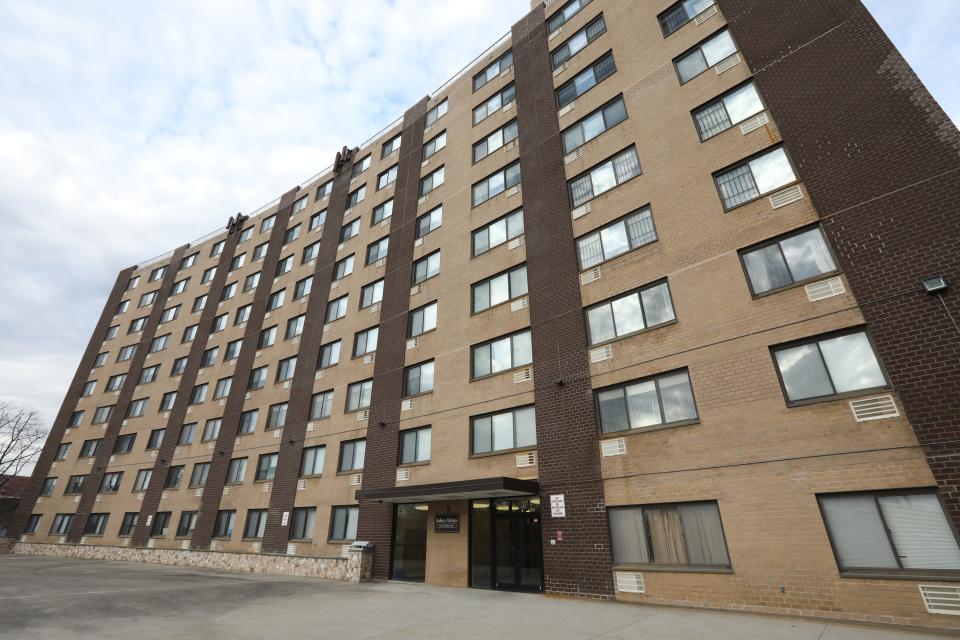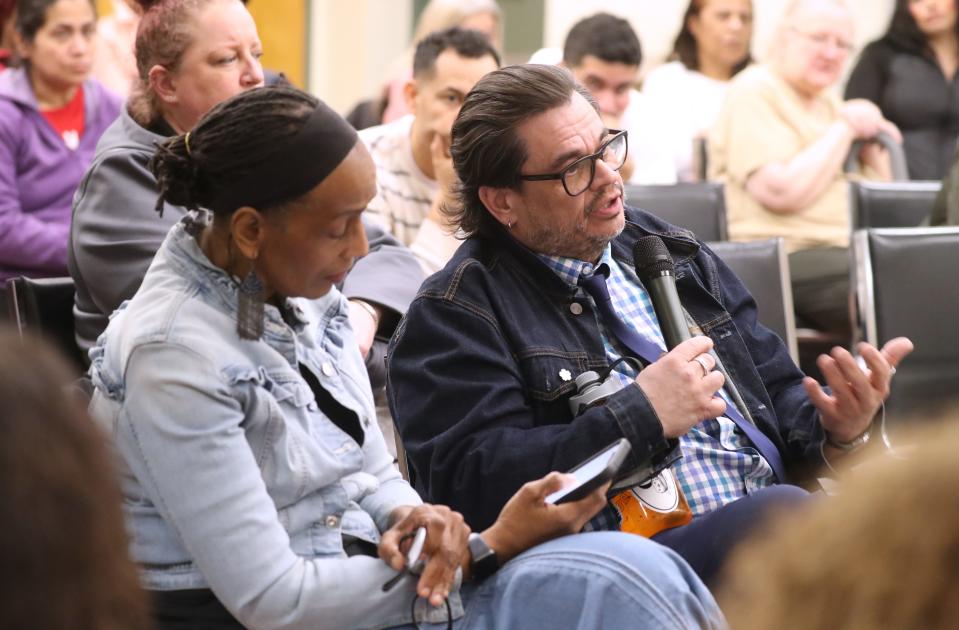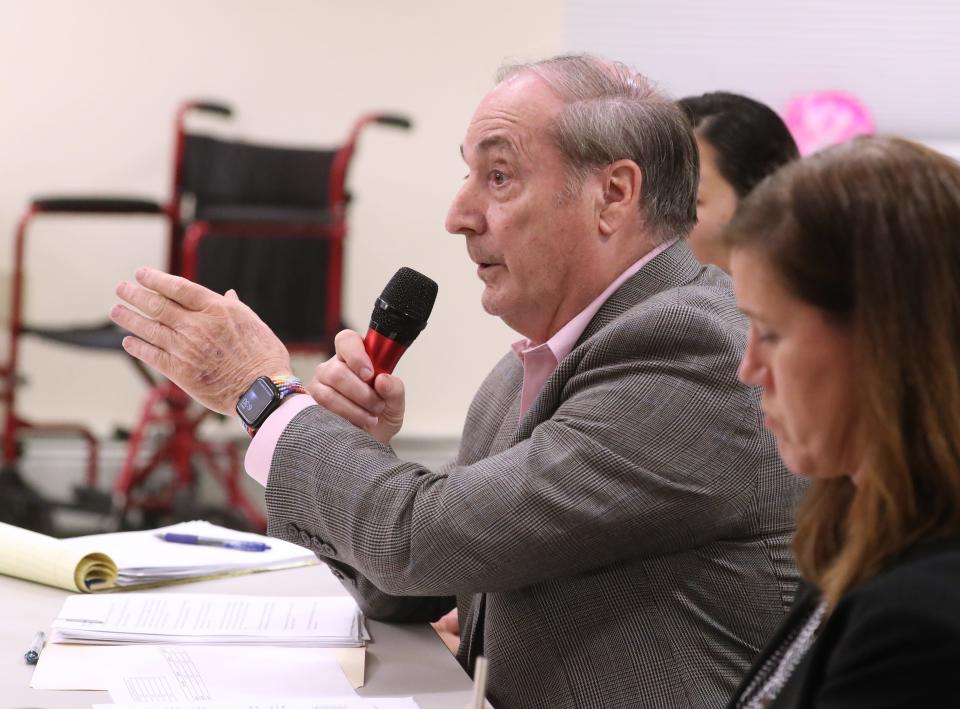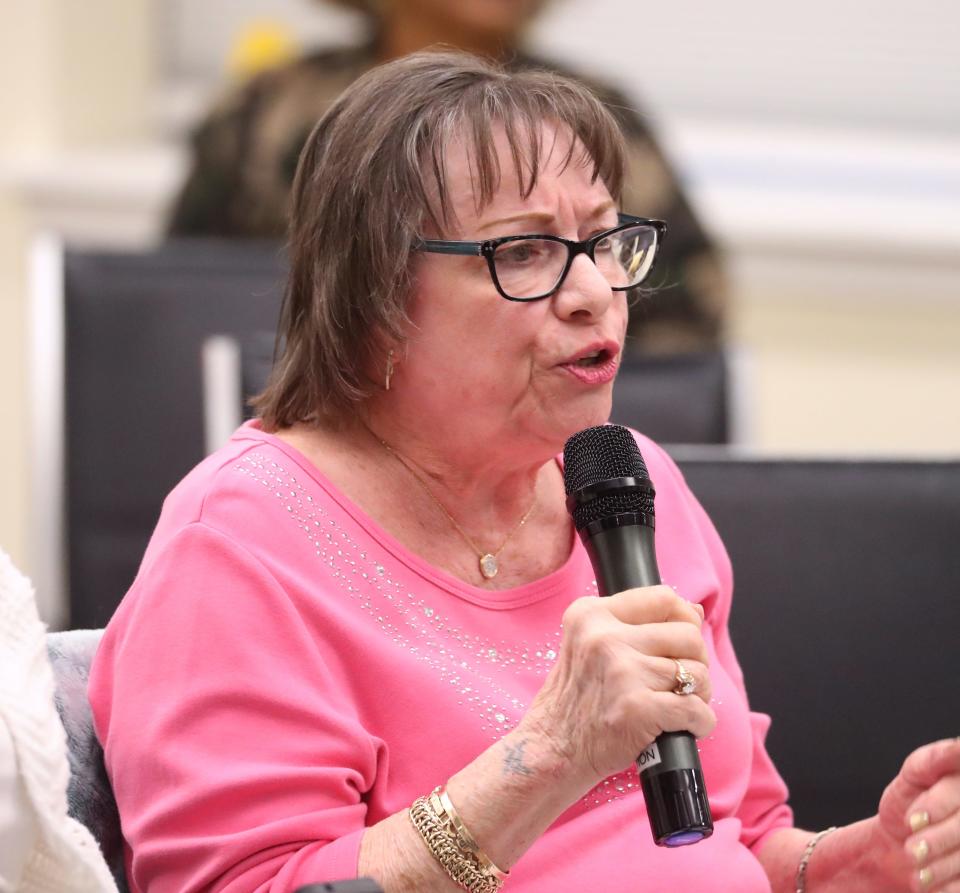Rent hike battle at Tarrytown affordable high-rise as new landlord seeks 'standard' scale
In a region where you’d be lucky to find a studio apartment for $1,600, Dave Cova resides in a three-bedroom apartment in Tarrytown, paying $1,593 in monthly rent, including utilities.
He lives with his 23-year-old son at Asbury Terrace, a federally subsidized high-rise with glorious views of the Cuomo Bridge and the Hudson, where tenants like himself who make too much to qualify for rent subsidies are enmeshed in a fierce battle with the complex's new owner over proposed rent increases.
They've enjoyed below-market rents for many years because the building's former owner chose not to increase them. But those rents are on target to vanish in September, almost four years after the building's sale.

Cova was notified in February that his rent would skyrocket 81% to $2,885 in September. The monthly increase of $1,292 would put a serious crimp in his plan to save enough by 2027 to afford a down payment on his own place.
“It’s a sledgehammer,” said Cova, a counselor at The Mount Pleasant Blythedale School. “I’m working three jobs so I can save enough to get out of here.”
The rent hike, however, might be lessened if Cova accepted the landlord’s offer to set his rent at 30% of his household's income. That's the same percentage paid by tenants in 60 of the building’s 106 apartments who qualify for federal rental assistance under the Section 8 program.
But Cova, like many of his fellow tenants, does not want to disclose his household's income, saying that such a requirement is too intrusive into his personal affairs. Cova's son works too, so his income would be included as well.
"It's not in my best interests to hand in my financials," said Cova, who has worked at Blythedale for 23 years. "To show my assets could put me in a vulnerable position."

The sale to Mountco
The battle over the future of Asbury Terrace has exploded in 2024, in the wake of the COVID pandemic and Mountco’s purchase of the building in 2020 from the Asbury Terrace Housing Development Fund Corporation. The nonprofit was formed in the late 1960s by faith-based organizations in Tarrytown that wanted to do their part to address the housing needs of the village’s low-income residents.
The building opened in 1971 down the hill from the village center, by the Hudson, at a time when that part of town was a gritty industrial area. Since then, million-dollar condominiums have risen by the river bank.
The complex was overseen by a nonprofit board of directors. Heading up the volunteer board since the early 2000s was Sadie McKeown, a Tarrytown resident and statewide leader in New York’s affordable housing sector at the Community Preservation Corp., where she now serves as president.
To serve the low-income community, Asbury Terrace has a contract with the federal government to provide subsidies to 86 low-income households under the federal Section 8 program, considered the gold standard for housing aid. It guarantees landlords market-rate rents for qualified tenants, who pay 30% of their income for rent, with the federal government covering the difference.
But Asbury Terrace has only 60 households that qualify for Section 8, leaving 26 of its Section 8 slots unused, said Gene Conroy, president of Community Housing Management, a private company that manages 32 buildings with 3,500 affordable units in the metro region and has managed Asbury Towers since its inception.
Conroy said that turnover is low, with only three units vacated in 2023, as those who don't qualify for Section 8 have enjoyed the below-market rents.
Community Housing Management received $113,000 in monthly rent assistance from the federal government in January, which averages about $1,900 from each Section 8 tenant for a month. That means about $600,000 a year in federal housing aid for low-income residents remains untapped.
Over-income tenants have stayed
While there hasn't been room for more low-income tenants who would qualify for federal aid, some long-time tenants who are considered "over income" by federal standards have remained.
Conroy noted that the tenant parking lot at Asbury Terrace houses luxury cars made by Mercedes Benz, BMW and Lexus.
"People who move out either buy a home, or are senior citizens who die," said Conroy. "Rents have been low. You aren't going to leave this building, on the Hudson, with the beautiful views, free parking, and your only surcharge is for air-conditioning."
Tenant Audrey Thomas, who said she qualified for Section 8 when she moved in 43 years ago, said the program allows over-income tenants to remain. Like Cova, she's not going to disclose her income.
"It seems like they want us out," said Thomas. "But the criteria for the program says that once you are in, you are in. They aren't supposed to mess with us."
New landlord wants 'recognized standard' for rent percentage
The new landlord, Mountco Construction & Development, purchased the building for $15.5 million in 2020, with the proviso that the building remain "affordable" for 50 years. The company executive vice president, John Madeo, maintains that fair is fair: the over-income tenants should pay a similar share of their incomes to what tenants with federal subsidies are paying.
The company, which owns and manages about 20 affordable housing complexes in the metropolitan region, needs to cover its mortgage and costs associated with rental property, many of which have risen due to inflation.
“We understand the rent notice was jarring,” said Madeo. “But paying 30% of your income for rent is a nationally recognized standard for housing. If you choose not to have your income certified, that’s your choice.”
Madeo said the new rent levels set by Mountco — $1,934 for a one-bedroom, $2,252 for a two-bedroom and $2,885 for a three-bedroom — are what tenants would pay with incomes of $80,000 for a one-bedroom, $94,000 for a two-bedroom, and $105,000 for a three-bedroom.
Asbury Terrace's story and sale
McKeown said the decision to sell the property arose in the late 2010s, after the nonprofit had paid off a $2 million loan for building repairs, and was awash in cash flow because there were no more loan payments to make. The rents for over-income tenants had not risen for several years.

McKeown also served at one time on the board of the YMCA in Tarrytown. She said she was approached by the Y, which was considering closing its facility on Main Street in Tarrytown, which included 50 single-occupancy rooms.
She worked out a plan to sell Asbury Terrace to an affordable housing company, which turned out to be Mountco, with the proceeds of the sale going to the nonprofit Housing Action Council and earmarked for affordable housing projects in Tarrytown. So far, $10 million was invested in the 107-unit affordable housing project at the site of the YMCA, under construction by Wilder Balter Partners, one of Westchester's preeminent developers of affordable housing.
The investment was a way to help create new affordable units, ensure Asbury Terrace remained in the Section 8 program, a support the YMCA site project, which also created 70 public parking spaces in downtown Tarrytown.
Housing Action Council Executive Director Rose Noonan said several requests are pending for the remaining funds, including a project proposed by National Resources by the Tarrytown train station that would include affordable units.
Did faith-based organizations support sale?
Critics of the 2020 sale have questioned whether the faith-based organizations involved in forming the Asbury Terrace nonprofit were properly notified of the impending transaction.
Attorney Adam Bradley, who was working with one of the congregations, said some were blindsided to learn that the board approved the deal in May of 2020.
“I’ve spoke to the religious leaders, and they received no notifications of any of this,” he said. “They didn’t learn about it until after the fact.”
Under the nonprofit’s incorporation documents, six congregations could have representation on the board. Conroy said board members, which included several from religious organizations, were notified.
At least one house of worship, Christ Church San Marcos Episcopal, was present.
“We had our representative at the board meeting,” said the Rev. Bill Baker, pastor of Christ Church San Marcos. “The company says it won’t charge more than 30% of a tenant’s income for those who don’t qualify for Section 8, which doesn’t seem like a horrible thing. If that’s too much, then that will open up a unit for someone who qualifies.”

Tenants, meanwhile, are considering their next moves. On the 9th floor, Thomas, 69, who retired from Siemens Healthineers USA in Tarrytown, and Madeline Viruet, 58, a secretary for judges in state Supreme Court in the Bronx, are in no mood to share what they earn each year with Mountco.
The rent for their two-bedroom apartments would rise $990 a month — from $1,362 to $2,352 — if they don’t disclose what they earn.
“I was on Section 8 when I moved in here in 1981, and I was glad when I made enough to get off of it,” said Thomas. “I don’t like it when it seems like they are in my business. You get the feeling that they own you. If we made a lot of money, I wouldn’t be living here. So I’m between a rock and a hard place.”
Sign up for Wilson's weekly newsletter for insights into his Tax Watch columns.
David McKay Wilson writes about tax issues and government accountability. Follow him on Twitter @davidmckay415 or email him at dwilson3@lohud.com.
This article originally appeared on Rockland/Westchester Journal News: Westchester NY affordable high-rise sees rent hike battle with new owner

